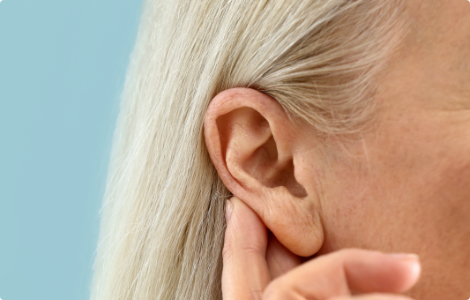Hearing – How the Ear Works
Patient Links
Everything you need, all in one place.
Below you’ll find everything you need for before, during and after your visit, as well as additional information on hearing healthcare.
Online Hearing screening
Think You Might Have Hearing Loss?
Take our free, five-minute online screening to get a better understanding of your hearing health. It can determine if a professional evaluation is right for you.
Hearing Loss
What Exactly is Hearing Loss?
Hearing loss is the total or partial inability to hear sounds in one or both ears. It happens as a result of the aging process, noise exposure or other health conditions. A diagnostic evaluation is the best way to identify your degree of hearing loss and develop the best treatment plan.


What should I know about ear cleaning? Though it’s important to take care of your ears, you only need to routinely clean the outer part of your ear. The top tips for safe ear cleaning include: Cleaning the outer ear When cleaning your outer ear, simply use a washcloth, which won’t hurt your ear and…
More on Ear CleaningsDo you have questions about hearing aids? Our Consumer Guide to Hearing Aids provides an in-depth breakdown of the different types of hearing devices, as well as the technology available for all forms of hearing loss.
More on Guide to Hearing AidsIf you’re trying to better understand your hearing loss, a basic comprehension of how the ears work can help. While our auditory system is incredibly complex, this page breaks down key information that can help shed more light on your hearing health.
More on Hearing – How the Ear WorksDid you know issues with your auditory system can impact your balance? That’s why hearing professionals don’t simply treat hearing loss, they also provide solutions for dizziness and a number of other hearing and balance disorders.
More on Hearing and Balance DisordersWhether you’re a performing musician or an avid concert attendee, taking care of your hearing around loud music is imperative. This guide breaks down your options for hearing protection that won’t compromise your ability to listen for the correct notes, pitches and keys.
More on How to Prevent Hearing Loss for MusiciansIf you suspect hearing loss, getting evaluated and treated early is the best thing you can do to prevent further deterioration. Untreated hearing loss can negatively impact your psychological, cognitive and physical health, as well as affect your ability to socialize and connect with the world around you.
More on Impacts of Untreated Hearing LossAs hearing professionals, we have our finger on the pulse of the hearing healthcare industry. If you’re interested in the latest hearing technology advances, studies and updates, check out our news page.
More on Latest Hearing Health NewsWhat is Meniere’s disease? Meniere’s disease occurs when fluid accumulates in your inner ear. The exact cause hasn’t been identified, but the excess fluid may be associated with the production of too much fluid, allergies, genetics, or, possibly, autoimmune disorders. Though this condition can begin at any age, it typically appears between the ages of…
More on Meniere’s DiseaseWhat causes hearing loss? Hearing loss develops from different causes, depending on whether you have conductive hearing loss, sensorineural hearing loss, or both, which is called mixed hearing loss. Conductive hearing loss This type of hearing loss develops when a problem in your outer or middle ear prevents sound waves from reaching your inner ear.…
More on Types of Hearing LossTinnitus
Buzzing, whirring or ringing in your ears? It could be tinnitus.
Tinnitus is described as unwanted noises in one or both ears. It’s a common, yet frustrating condition that can dramatically impact quality of life. Luckily, many patients have found relief through treatments that effectively ease their symptoms.

Financing
Billing & Insurance Information
We believe in accessible hearing healthcare and strive to offer a variety of payment plans to help fit every budget. Read below to learn more about insurance coverage, financing plans and billing.
-
Care Credit
We accept CareCredit cards to make improving your hearing health more budget-friendly. CareCredit offers special financing on purchases of $200 or more for healthcare costs not commonly covered by insurance, including hearing aids.
-
HealthiPlan
HealthiPlan offers special financing ideal for products and procedures that aren’t always covered by insurance. With HealthiPlan, you can get flexible payment plans for care that work within your budget – no hidden fees and no down payment required.
